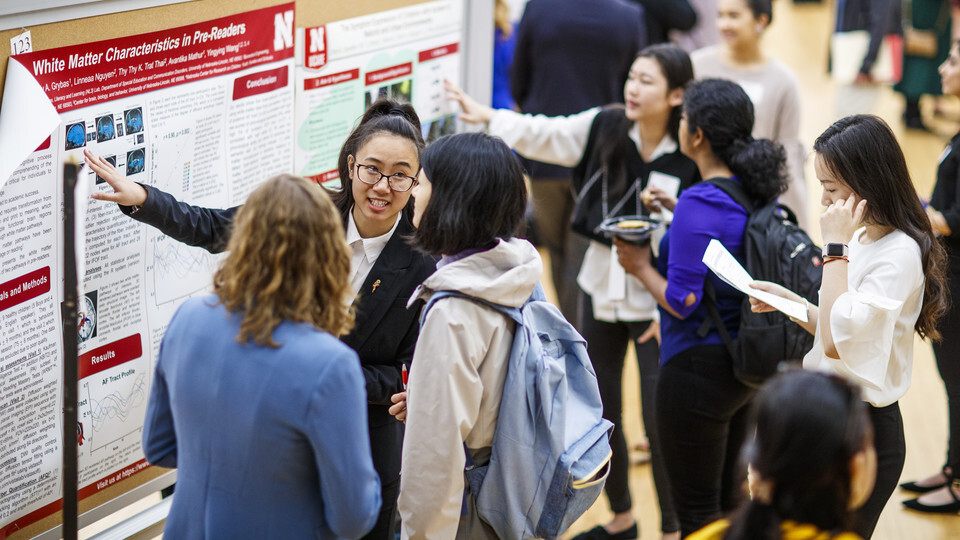University Communication and Marketing, May 4, 2022
Student Research Days competition winners announced
The Office of Research and Economic Development, Office of Graduate Studies and the Office of Undergraduate Research sponsored four poster sessions for students to present their work April 11-12.
As part of this event, students had the option to compete in a poster competition. Top graduate presenters earned $400 travel grants and awards to support their research work. Top undergraduate presenters were supported by their respective colleges and provided a $250 financial award. Nearly 100 graduate students presented their work as did more than 200 undergraduates. Additionally, five undergraduate students were recognized by the University Honors Program for their research.
More than 70 faculty, postdocs and graduate students helped judge the posters, and there were more than 25 individuals who volunteered at the event.
Graduate Student Winners
- Emmanuel Akintunde (Civil Engineering) – “Developed Singular Value Decomposition Based Novelty Index for Damage Detection in full-scale in-situ bridges”
- Qusai Alomari (Civil Engineering) – “Bridge Pier Column Multi-Hazard Response – Fire, Impact, and Blast”
- Sean Carr (Biological Sciences) – “Optimizing Scale Production of Isoprene from Engineered Methanogens”
- Zachary Cole (Psychology )- “Neural Responses to Functional Animation of Pictorial Symbols to provide P300-Brain-Computer Interface Access to Children”
- Beth Dotan (Teaching, Learning and Teacher Education) – “Nebraska Stories of Humanity, Holocaust Survivors & WWII Veterans, Network Portal and Educational Website.” This project was co-presented with undergraduate student, Aila Ganic.
- Alexa Fernandez (Earth and Atmospheric Sciences) – “Satellite vs Marine Potential Fields Over Bathymetrists Seamounts”
- Katie Kassler (Communication Studies) – “Managing Identity, Relationship, and Privacy: Communication Strategies Central to LGBTQIA+ Identity Concealment from Family Members in the United States”
- Quinlan McFadden (Architecture) – “Prototyping Attainability”
- Erika Petro-Turnquist (Biological Sciences) – “Vaccination with Epigraph Immunogens Induce Robust Immunity Against Swine H1 Influenza A Virus”
- Andrea Rilakovic (Entomology) – “Comparison of aerial and chemigation insecticide applications for western bean cutworm management”
- Qiuchen Wu (Physics) – “Ferroelectric domain studies in free-standing PbZr0.2Ti0.8O3 membranes”
- Weiman Xu and Shruti Pillai (Child, Youth, and Family Studies) – “Intergenerational Transmission of Parenting Across 24 Years”
The College of Engineering provided additional funds for winners from their field. The following four students also received top honors and monetary awards from their college:
- Faezeh Afshar Hatam (Mechanical Engineering) – “Quantification of the Interlamellar Bonds of Plant Pavement Cells”
- Fei San Lee (Biomedical Engineering) – “Screening for nerve dieback compounds in a dorsal root ganglia explant 3D hydrogel culture”
- Xiaowei Jin (Biomedical Engineering) – “Mechanical stretch mitigated pemphigus vulgaris induced dissociation of cell-cell junction”
- Anne Stratman (Electrical Engineering) – “Bidding Wind and Solar as Reserve Products in US Electricity Markets”
Undergraduate Student Winners
College of Agriculture and School of Natural Resources
- Katie Bathke – “Economic and input-use efficiency impacts of nitrogen management techniques in non-irrigated maize production” (Lincoln)
- Skyler Gubbels – “Techniques to Study Ticks and Tick-Borne Pathogens in Nebraska” (Norfolk)
- Clarissa Mason – “Theoretical Development of DnaG Primase as a Novel Narrow-Spectrum Antibiotic Target” (Huntley, Illinois)
- Laetitia Igiraneza Sinyigenga – “Toward a framework for the assessment of the socio-economic impacts of irrigation under variable surface water-groundwater interactions” (Rwanda)
College of Architecture
- Jacob Essink – “Omaha Lead Pollution: Proactive and Restorative Strategies for Environmental Justice in Landscape Architecture” (Gretna)
College of Arts and Sciences
- Quin Barton – “Melanin Production in Novel Polyextremotolerant Fungi Species” (Glenwood, Iowa)
- Ronit Gandhi – “Utilizing Markov chains to estimate allele progression through generations” (Omaha)
- Paul Koesters (Omaha) and Janana Khattak (Lincoln) – “Central Places and Retail Trade Across the Midwest”
- Grant Neuverth – “Lincoln Medical Archaeology” (Gretna)
- Maggie Ramsay – “Morphology Control of SnS Nanoplatelets Towards Application as a Two-Dimensional Chemoresistive Gas Sensor” (Lincoln)
- Alyssa Simpson – “Ferroelectric Domain Studies of Free-Standing PbZr0.2Ti0.8O3 (PZT) membranes” (Jamaica)
- Elinor Stanley -“Analysis of a Novel Infantile Cardioencephalomyopathy-Associated Mutation in Yeast Genetic Model” (Columbia, Missouri)
- Jessica Stump – “Examining the Impact of Political Identification and Morality on Compliance with COVID-19 Public Health Measures” (Bakersfield, California)
College of Business
- Daniel Pruski – “Covid Effects on Retail Trade and Hospitality” (Dallas, Texas)
- Victoria Diersen – “Linkage Between Federal Small Business Innovation Research Grants and Innovation Factors in the States” (Brookings, South Dakota)
College of Education and Human Sciences
- Anna Suppes – “Teachers’ Perceptions About the Malleability of Reading & Writing Skills of Students with Intellectual and Developmental Disabilities: A National Survey” (Fargo, North Dakota)
College of Engineering
- Judith Brown – “Using Nonlinear Energy Sinks to Diminish Vibrations in High-aspect Ratio Wings” (Lincoln)
- Jarod Harris – “Investigation of CO2 Capture in Supported Ionic Liquids Membranes” (Seward)
- Xuan Le – Structure – “Guided Engineering of a Short-Chain Alcohol Dehydrogenase for Asymmetric Synthesis” (Vietnam)
- Isaac Regier – “Rapid Prototyping Techniques for Neutral Buoyancy Lab Tool Development” (Lincoln)
- Simon Schoenbeck – “Data Structures for Representing and Encoding Gene Expression” (Omaha)
Hixson-Lied College of Fine and Performing Arts
- Zachary Cheek – “The Impact of Afghan Opium Cultivation on the American Opioid Epidemic” (Elkhorn)
University Honors Program
- Zachary Cheek – “The Impact of Afghan Opium Cultivation on the American Opioid Epidemic”– Award for Most Original Research Question, Approach and/or Methodology (Elkhorn)
- Ronit Gandhi – “Utilizing Markov Chains to Estimate Allele Progression through Generations” – Award for Best Communication Skills (Omaha)
- Abbey O’Brien – “Wakara’s West” – Award for Most Significant Long-Term Contributions to the Area of Study” (Omaha)
- Maggie Ramsay – “Morphology Control of SnS Nanoplatelets Towards Application as a Two-Dimensional Chemoresistive Gas Sensor” – Award for Most Significant Potential for Real-World Impact (Lincoln)
- Simon Schoenbeck – “Data Structures for Representing and Encoding Gene Expression”– Award for Best Use of Interdisciplinary Approaches or Methodology (Omaha)
Office of Graduate Studies Office of Research and Economic Development Office of Undergraduate Research Research Days






